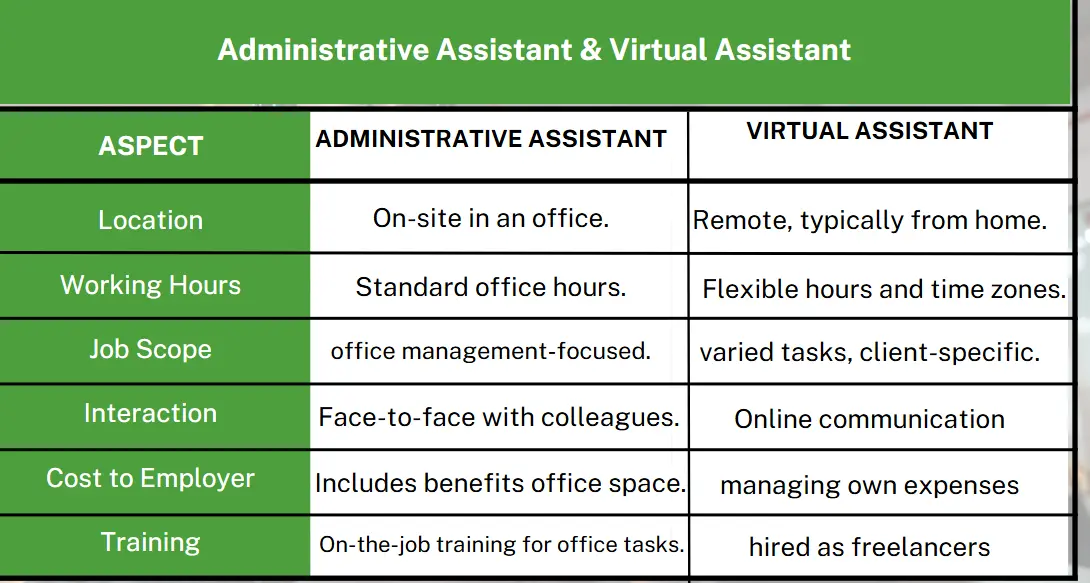The debate between Administrative Assistant Vs Virtual Assistant, who is better or who to hire, never leads to an exact answer. The reason is both of the roles are different regarding their location, flexibility, salary range and so on.
Virtual assistants are remote workers support clients, executives or business handling several responsibilities often repetitive and time-consuming. Whereas, an administrative assistant present physically in office, support office executives, and ensure a effective communication.
So, as you can see, both employees have their own advantages and disadvantages. Who to hire totally depends on what your business needs. So, today, let’s talk about the difference between administrative and virtual assistants. In the end, you will surely come to a conclusion that is right for you.
Administrative Assistant Vs Virtual Assistant: The Main Difference

A virtual assistant supports clients or businesses with different services based on industry or business type from a remote location. These independent contractors are flexible with working hours and may work on a contractual, project, or hourly basis. However, with the ongoing demand, businesses are diverting more into hiring full-time virtual assistants.
Contrary, an administrative assistant support office staff and executives by managing administrative tasks by being present in the office physically. They usually work full-time and are not flexible to working hours as they need to work for a bound time.
Regardless of the work environment, salary ranges also differ between administrative and virtual assistants.
A virtual assistant is charged on an hourly basis, sometimes after the completion of a project or on a monthly salary. They are also cost-effective solutions for businesses because there is no need to pay taxes or any additional benefits like paid leaves or health insurance. Even working from a distant location, these remote workers have their own equipment and offices need not pay for that too.
Talking about an administrative helper, like any in-house employee, these workers charge full salary with tax, paid leaves, health benefits, holidays and others. Companies bear all the expenses regarding the equipment they use in the office.
A VA a salary of around $39,915 every year, while an administrative assistant salary is approximately $34,945 annually.
Moreover, a virtual assistant is the boss of their own home office, where they have higher autonomy. They manage and schedule their working hours, and there is no fixed hour to work. They have full control over their work, and only delivering tasks on time is their goal.
Contrarily, administrative assistants works under senior level employee, and must follow company scheduled time, rules and regulations.
So, now you have a detailed and clear idea of how virtual assistants and administrative work structures differ from each other. Now, get a quick look at each employee’s advantages and disadvantages.
Responsibilities & Skills of Administrative Assistant & Virtual Assistant
| Responsibilities | Skills | |
| Administrative Assistant |
|
|
| Virtual Assistant |
|
|
The responsibilities and skill sets of both administrative and virtual assistants are different from each other. Virtual assistants are self-motivated and continuously update their skills and work for multiple clients and industries. But an, administrative helper have fixed skill sets and focus on their assigned tasks based on their executive needs.
An administrative assistant manages the day-to-day operations within an office setting. Their responsibilities often include scheduling appointments, managing correspondence, maintaining files, and handling calls. Additionally, they may be tasked with organizing meetings, preparing reports, and supporting other staff with administrative tasks.
To handle the responsibilities the administrative employee possess strong organizational abilities, effective communication, and proficiency with office software like Microsoft Office Suite
In contrast, a general virtual assistant performs many similar tasks but does so remotely. They provide support to businesses, entrepreneurs, or teams from a home office. They may handle email management, scheduling, customer support, and even content creation, depending on the needs of the client.
Key skills for a virtual assistant include excellent digital communication, familiarity with online collaboration tools such as Slack, Trello, or Asana, and strong time management skills. They must be adaptable, as they often work independently.
Pros & Cons of an Administrative Assistant
Where the administrative assistant handles most of the office work and continuously supports in-house office members, they also come with a couple of cons, like higher overhead costs. Here, check the advantages and disadvantages,
Pros
Efficiency Enhancement: An administrative assistant’s core duty is to free up other team members’ time so they can focus on core business activities. Thus, they efficiently manage all the clerical or administrative tasks for their senior executives or company.
Organizational Skills: These in-house professionals possess great organizational skills, with which they manage all the tasks synchronized, keep the files properly, schedule meetings, and so on. With their unseen contribution, the office work stays smooth and hassle-free.
Communication Hub: The administrative work is most often done as a central communication hub. It can be between an in-house team or between internal and external stakeholders. They collaborate with the team and clients for effective communication.
Supportive Role: Administrative assistants are more like a support for the on-site team members. They support for any business operations, daily repetitive tasks or where it takes more time but less important.
Consistency: The best part of an administrative helper is they quality of work and performance. They may get training from the company or pre-trained and understand business working style quite well. Also, stay in a long-term commitment and grow with the business growth.
Control: With an administrative assistant it is easy to control their working hour, and quality of work, and improve them with training or feedback continuously.
Easy hiring: Businesses can choose, assess and find the best administrative employee with face-to-face employees when hiring. This makes the hiring process easy and effective.
Cons
Overhead Expenses: Indeed, an administrative assistant avails all the benefits like any other on-site employee, which increases the company’s overhead cost. Also, the company bears yearly taxes and other benefits.
Adaptation to Change: These professionals often find it difficult to adapt to changing trends and technology. They stick to their initial skills and are unwilling to learn newer skills as per industry demand.
Miscommunication: Since administrative helpers work as a communication hub, even slight misinformation or miscommunication can result in hefty costs.
Pros & Cons Working as a Virtual Assistant
Virtual assistants nature to work from anywhere anytime, is their biggest advantages that today companies are availing. However, this flexibility come with a communication problem, too. Here are some advantages and disadvantages both you need to assess.
Pros
Flexibility: Virtual assistants are best at their working flexibility, as there is no fixed hour for them. Companies mostly benefitted by outsourcing when in-house employee are not vacation, or the business need immediate helping hand. These VAs can work on occasions, vacations, off-season, anything they need to.
Lower Costs: Hiring virtual helpers overseas makes them very cost-effective. In several regions, the VAs work at very low rates, and anyone can hire a virtual assistant at an affordable price range.
Skill Development: Virtual assistants have diverse skill sets and continuously try to refine and learn newer skills. They keep up with industry trends and train themselves accordingly.
Scalability: One of the core features of remote assistants is their scalability based on business needs. It is better to hire a virtual assistant when it is peak season without hiring an additional helper.
Global Talent Pool: Because virtual assistants are flexible and can work from a remote location, clients and companies have access to the global talent pool. They can hire anyone with high-quality skills and experts overseas.
Cons
Communication: VAs work from a remote location, and there is no physical interaction. This makes it difficult to communicate clearly. You need to spend more time and invest in communication tools to create effective communication, which can sometimes be tough due to sudden technical or other issues.
Reliability: VAs are not bound to work with only one client, so they may not show any long-term commitment to you. Sometimes, VAs can terminate or stop working without any notice periods.
Which one is the Perfect Choose for You?
Which administrative or virtual assistant is perfect for you? Honestly, there is no fixed answer because it depends on your business requirements.
For those who have online businesses or need to engage with B2B clients, more virtual helpers are most suitable for them. Also, for short-term or seasonal needs, virtual assistants can become an extra helping hand, and when the project is over, you no longer need to pay them.
Another factor in hiring a virtual assistant is budget and affordability. Small businesses or entrepreneurs have limited budgets, and a VA can reduce costs by 78%. For these types of businesses, a VA is an affordable option.
On the other hand, if your business working environment requires a physical presence and in-house employees need consistent support, an administrative helper is perfect. Also, for long-term commitment and loyalty to your brand, an administrative assistant dedicatedly serves for years.
Read the relevant article about Virtual assistant vs Employee.
Conclusion
Whether you go for an administrative assistant or a virtual assistant depends on what your business needs.
If you need someone on-site for hands-on tasks and face-to-face interaction, an administrative assistant is the way to go. But if you’re looking for flexibility and want to save on costs, a virtual assistant might be the better choice.
Just think about the kind of tasks you need help with and your budget, and you’ll be able to make the right decision.

